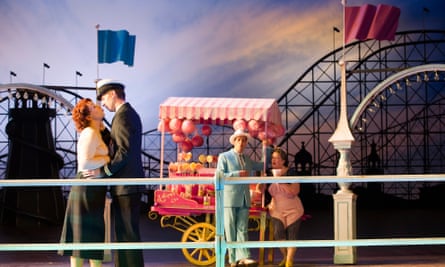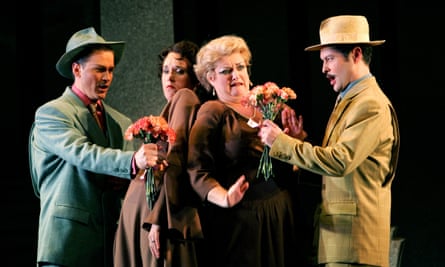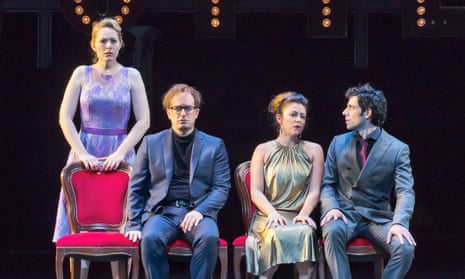It was with The Marriage of Figaro, the first of Mozart’s three momentous Da Ponte operas, that I began my career as an opera director, six years ago at Augsburg theatre in southern Germany. And it’s to another of his Da Ponte operas that I turn for my first production for the Royal Opera House, Così fan Tutte.
For me, the great quality of the Da Ponte operas (Figaro, first performed in 1786, Don Giovanni in 1787, and Così in 1790) lies in their ability to show us how we really are – mercilessly and yet affectionately at the same time. In their characters we encounter our own human weaknesses and the challenges we face. They can make us freeze in horror, or collapse in laughter. “Piu docile sono” says the Countess at the close of Figaro – “I am wiser”. She has learned something about herself and about others – and we have learned with her.
Così fan Tutte even says it in its subtitle: The School for Lovers. And it’s true that everyone who loves can learn something from this work. Da Ponte insisted for a long time on having this as his work’s main title, and it was how he referred to it throughout his memoirs. But Mozart preferred Così fan Tutte, which is a quotation from his earlier opera Figaro, where the music teacher Basilio sings: “Così fan tutte le donne” – that’s how all women do it. So in the title it’s women who are the guilty ones. It’s they who cheat. They’re unmistakably referred to in the feminine ending of the “tutte” – all men would be “tutti”.
Perhaps Da Ponte was aware of this misogynistic aspect when he advocated the more neutral title La Scuola Degli Amanti. After all, “amanti” includes both men and women. But Mozart preferred Così fan Tutte it is assumed because The School for Lovers is very close – too close – to the title of another opera by Mozart’s musical rival Salieri: The School of Jealousy (La Scuola de’ Gelosi).
And so Da Ponte’s title was relegated to the status of a subtitle. It’s a shame because, for me, it goes right to the heart of the opera.
So what can we learn at this school for lovers? That infidelity is part of every one of us, and that no one is free of it in either thought or deed? This in itself is hardly new; but what Così does demonstrate is just how inconstant our feelings are. Don Alfonso is the master of ceremonies – really the puppet master – and he stages a test of fidelity. Two women are to be seduced by two foreigners while their lovers are away, but these foreigners are in fact their own lovers in disguise, seducing each other’s partner.

Don Alfonso’s experiment succeeds, but at the opera’s close, the men are just as entangled as the women. All four have invested real feelings in a false game and have come far too close to their respective “victim” – who is not their own original partner, but their friend’s lover. The misogyny of which the opera is so often accused is in fact superficial. When Alfonso speaks dismissively of women’s constancy as “the Phoenix of Arabia”, ie something that everyone swears exists but no one knows where, he is doing so to fuel the fire of his intrigues and engage his pupils in his game. Having won his bet, he calls infidelity a “necessity of the heart”, and says that he therefore wants to “excuse“ the infidel.
And so it’s not surprising in this superficially misogynistic work that it’s Despina – Don Alfonso’s maid and collaborator – who asks the central question in a recitative that is easy to overlook: “Amor cos’è?” (What is love?) The young couples were very certain of its definition at the start of their story, but over the course of the opera their beliefs have been shaken. As, perhaps, have ours. Because the work shows us how varied and subtle are the powers that draw and bind us to each other. Love can be conjured up through certain encounters, situations and atmospheres – the charm of the exotic, the feeling of being in a different world that allows you to reinvent yourself, the bond that arises from feeling that you’ve saved the life of another, and lots more besides.
Everything that the lovers go through is set up by Don Alfonso and Despina. Thus love can be staged and constructed. But if this is the case, can any of us be certain about what we feel any more? Don Alfonso, an “old philosopher” according to the cast list, uses ambiance, mise-en-scène and dramatic situations to achieve his ends. In other words, he’s a stage director himself. “Non son cattivo comico” (“Aren’t I a great man of the theatre?”) he asks right after one of the most heartrending pieces in this tremendous score, the deeply felt Soave sia il vento. The opera is full of such ruptures, of allusions to the theatre, and also of quotations and self-references. It’s been called an “opera about an opera”, but the theatre that Don Alfonso stages shows us far more. It shows us how false emotion can turn into real emotion – even into something as intimate as love. This insight can be harrowing or comforting – or both simultaneously.

Don Alfonso’s role as the “director” of an experiment in love that uses theatrical means can be regarded as the key to my new production. There will be frequent changes of scene and of atmosphere, just as the libretto itself presupposes, but which one rarely sees in productions of the work today. And we decided to go one step further and have the story played out as if in an actual theatre. This has solved many of the opera’s problems. Every director of Così fan Tutte has to deal with the question of why the women don’t recognise their lovers through their disguises, especially since they get right up close to them. But if the women are led into a theatrical, imagined space at the very beginning, and if they are seduced into believing fictions, then this contradiction no longer applies.
The theatre space also embodies the basic conflicts of the work in itself. Our stage is a world of unlimited possibilities and self-discovery where boundaries may be transgressed. The auditorium, on the other hand, still represents a clear societal order. Out there, we see a whole series of couples seated next to each other, dressed to the nines. The starting point for our production is thus: what if two of these respectable couples were to stray on to the stage? Would they still be the same people when they returned to their seats?
There is almost nothing that is more difficult than playing at play, enacting an enactment. But there is also hardly anything that is more fun if you can work with such a wonderful, young, enthusiastic cast as we have at the Royal Opera House. All the same, every production of Così also demands precision, and that’s especially true in our case. Who knows when, what and who is playing what to whom? And how can I act so that it’s plausible that I’m just acting? Then there are the challenges that arise when a German engages in a discussion in English about an Italian libretto with someone who is Spanish.
But luckily we have the music, where there are no lies or misunderstandings. It is the medium in which the real events of this opera are depicted: how play becomes serious, and how a theatrical staging can lead us to the existential question – how do I want to live, and with whom?

Comments (…)
Sign in or create your Guardian account to join the discussion